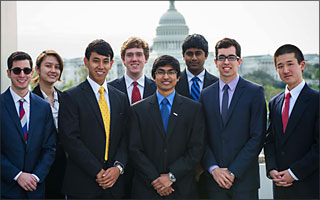A Johns Hopkins biomedical engineering student team has placed second in the undergraduate division of the Collegiate Inventors Competition for its AccuSpine pedicle probe, marking the third consecutive year that a Johns Hopkins team has been awarded a top prize in this challenge.
The team, led by Anvesh Annadanam, presented their invention to a panel of the most influential inventors and invention experts in the nation at the 2014 Collegiate Inventors Competition Expo held at the U.S. Patent and Trademark Office in Alexandria, Va.
AccuSpine was developed within the Center for Bioengineering Innovation and Design under the guidance of physicians Chetan Bettegowda and Sheng-fu Larry Lo of the university’s School of Medicine. The device makes placement of screws during spinal fusion more accurate. The prototype, which already has been tested on cadavers, has garnered nearly $85,000 in prize money at innovation challenges this year. This latest award, coveted among undergraduate and graduate inventors, includes a $10,000 prize.
“We are very fortunate to have had the opportunity to participate in this distinguished competition,” said AccuSpine team leader Anvesh Annadanam, a senior studying biomedical engineering. “We are very thankful for the support of our biomedical engineering department,” he said. “Our team will continue to work hard on the development of our device.”

